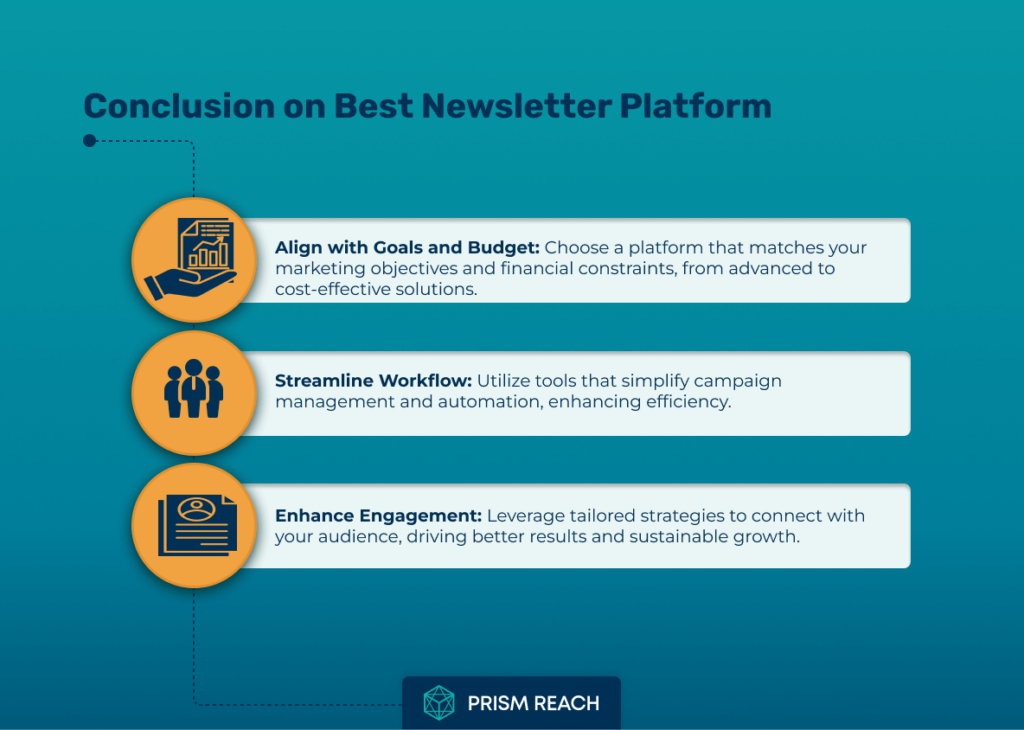In today’s digital landscape, newsletters have emerged as a powerful tool for businesses to engage with their audience, build brand loyalty, and drive conversions. However, with numerous newsletter platforms available, each offering a unique set of features and capabilities, choosing the right one can be a daunting task. The best newsletter platform not only meets your current needs but also scales with your business as it grows. This comprehensive guide explores the top newsletter platforms, integrates five hidden gem strategies to maximize your email marketing effectiveness, and highlights Prism Reach, an innovative AI-powered tool designed to elevate your email marketing campaigns through deep personalization.
At a Glance
Selecting the right newsletter platform can significantly impact your email marketing success. Here’s a quick overview of some of the top newsletter platforms that cater to various business needs:
- Mailchimp: The all-in-one solution for small businesses with a user-friendly interface and comprehensive features.
- ActiveCampaign: Powerful automation and CRM integration, ideal for businesses seeking sophisticated marketing workflows.
- Moosend: Cost-effective email marketing with advanced features and a user-friendly design.
- ConvertKit: Simplicity and powerful automation tailored for content creators and bloggers.
- Drip: E-commerce-focused email marketing with advanced segmentation and automation capabilities.
- MailerLite: Affordable and user-friendly, perfect for bloggers and small businesses.
- GetResponse: Comprehensive platform with e-commerce features and webinar integration.
- Sender: Free and user-friendly, with robust SMS marketing capabilities.
- Beehiiv: Innovative features and monetization options for newsletter creators.
- Prism Reach: AI-powered newsletter platform offering hyper-personalization and advanced analytics.
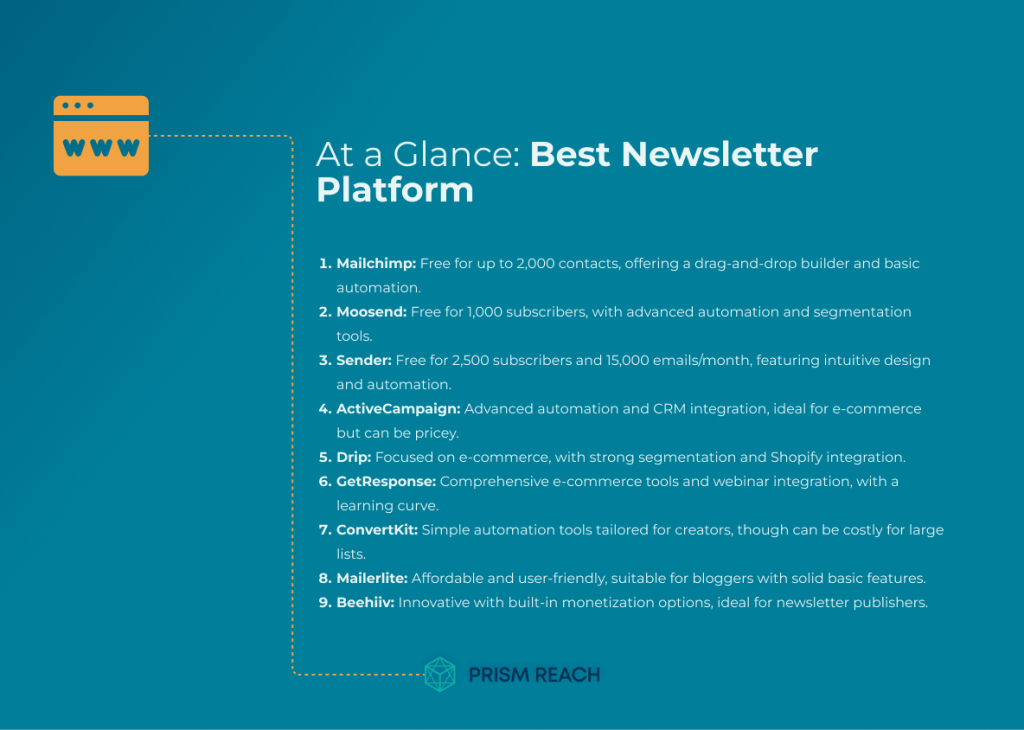
Upgrade Your Email Marketing with AI Personalization!
Best Newsletter Platform
Mailchimp
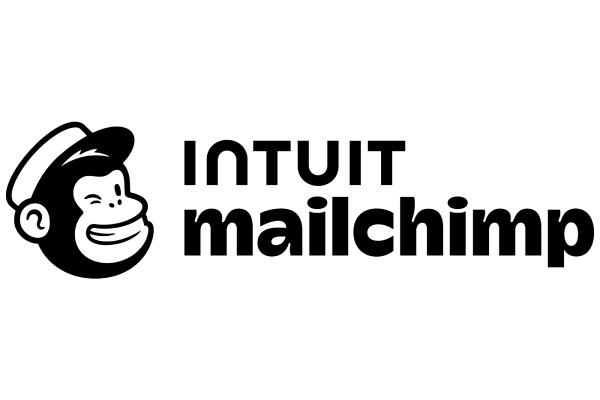
Pros:
✅ Comprehensive analytics and visualization suite.
✅ Test emails in multiple clients before sending.
✅ AI-driven insights improve segmentation.
✅ Understand user demographics with advanced tracking.
✅ Maintain brand consistency across email platforms.
Cons:
❌ Pricing increases with growing subscribers.
❌ Complex analytics may overwhelm beginners.
Moosend
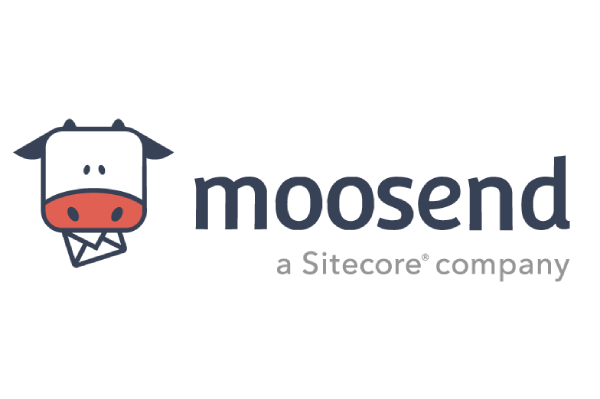
Pros:
✅ Personalized content adapts to user actions.
✅ Automation builder simplifies behavior-driven emails.
✅ Affordable yet feature-rich plans for businesses.
✅ Simple interface for beginners to navigate.
✅ Extensive template library for custom campaigns.
Cons:
❌ Basic segmentation options may limit complex strategies.
❌ Interface learning curve could overwhelm new users.
Sender
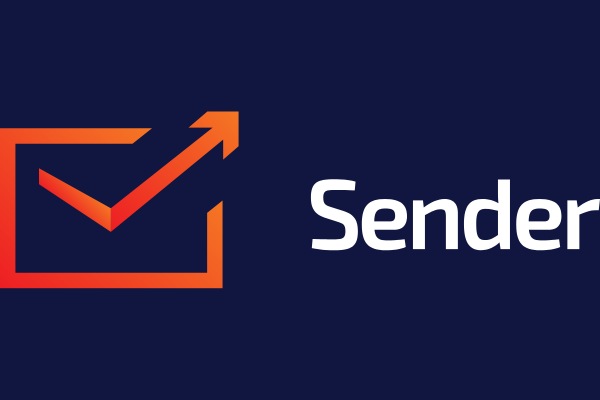
Pros:
✅ Generous free plan available.
✅ Supports up to 2,500 subscribers.
✅ Intuitive drag-and-drop email builder.
✅ Includes email and SMS marketing tools.
✅ Comprehensive campaign performance insights.
Cons:
❌ Limited features vs. established platforms.
❌ Slower customer support response times.
ActiveCampaign
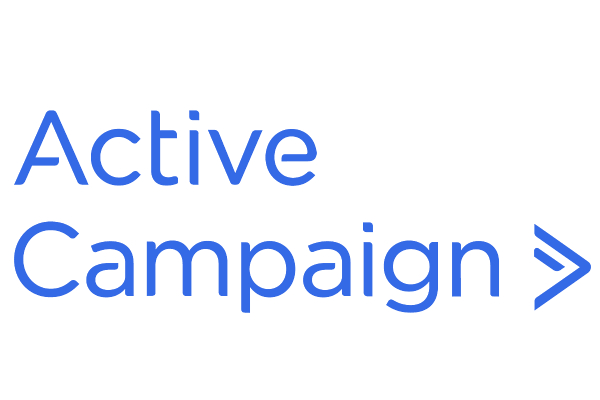
Pros:
✅ Extensive library of industry-specific templates.
✅ Automate sequences for efficient management.
✅ Integrates with 900+ CRM and e-commerce tools.
✅ Supports business growth through scalable automation.
✅ Allows deep customization for targeted campaigns.
Cons:
❌ New users might find features initially complex.
❌ Higher costs for advanced tools and integrations.
Drip
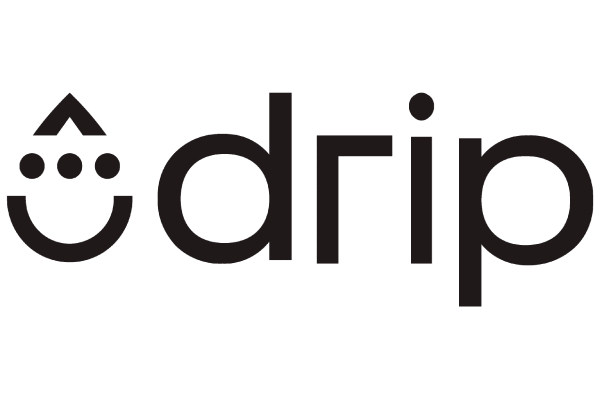
Pros:
✅ Integrates seamlessly with 150+ e-commerce platforms.
✅ Advanced targeting improves customer campaign efficiency.
✅ Understand customer preferences through detailed analytics.
✅ Integration enhances data accuracy and segmentation.
✅ Real-time insights drive targeted, relevant marketing.
Cons:
❌ Learning curve with numerous features and integrations.
❌ Advanced tools come with a premium price tag.
GetResponse
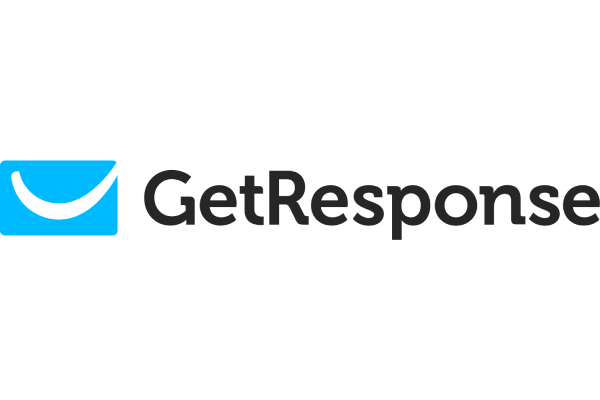
Pros:
✅ Integrated webinar hosting capabilities.
✅ Seamless e-commerce platform integrations.
✅ Advanced e-commerce tools like abandoned cart emails.
✅ Comprehensive campaign analytics and reporting.
✅ User-friendly drag-and-drop email builder.
Cons:
❌ Pricing scales with contact list size.
❌ Advanced features have a learning curve.
Kit (formerly ConvertKit)
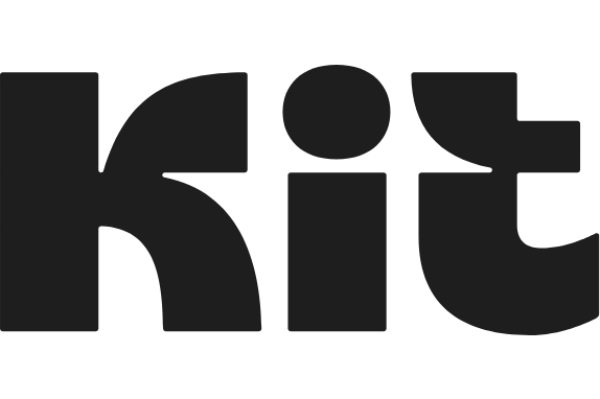
Pros:
✅ Comprehensive automation sequences improve targeting.
✅ Tailor workflows with customizable triggers and actions.
✅ Efficiently segment subscribers for personalized content.
✅ Increase engagement with behavior-driven communication.
✅ Simple, user-friendly interface for campaign setup.
Cons:
❌ Initial setup for automation sequences is intricate.
❌ Higher price point for advanced automation features.
MailerLite
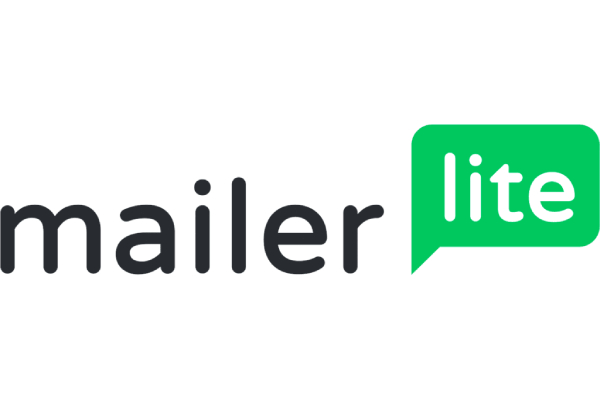
Pros:
✅ Intuitive email builder with drag-and-drop.
✅ Free plan supports up to 1,000 subscribers.
✅ Affordable plans scale well with growth.
✅ User-friendly tools streamline email marketing.
✅ Clear navigation aids beginner marketers.
Cons:
❌ Limited integrations restrict larger organizations.
❌ Basic analytics on the free plan.
Beehiiv
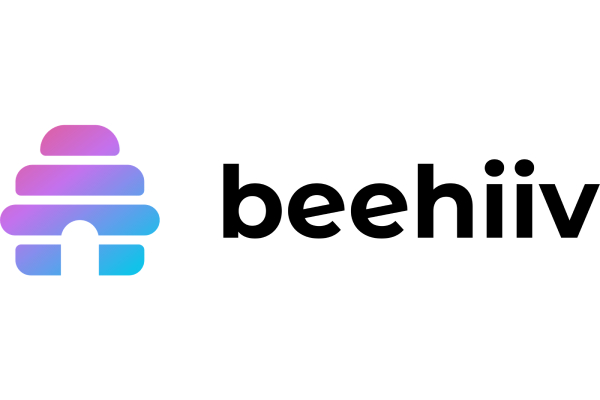
Pros:
✅ Extensive customization without coding skills.
✅ Advanced subscriber behavior analytics.
✅ Built-in ad network for monetization.
✅ Zero commission on subscriber revenue.
✅ Integrations with popular tools and services.
Cons:
❌ Smaller user community than established platforms.
❌ Pricing less attractive as subscribers increase.
Best Newsletter Platforms for Small Businesses on a Budget
When it comes to small businesses with limited budgets, finding a newsletter platform that offers a balance of affordability and essential features is crucial. In this section, we will explore three options that cater specifically to this use case, helping you make the most of your investment.
Mailchimp: The All-in-One Solution for Small Businesses
Mailchimp is a popular choice among small businesses, thanks to its user-friendly interface, comprehensive feature set, and affordable pricing. With a free plan that supports up to 2,000 contacts and 10,000 sends per month, Mailchimp allows small businesses to get started with email marketing without any upfront costs.
The platform offers a drag-and-drop email builder, pre-designed templates, and basic automation capabilities, making it easy for users to create professional-looking campaigns and automate essential tasks. Mailchimp also provides a range of integrations with popular e-commerce platforms and CRM systems, enabling businesses to streamline their marketing efforts.
However, as businesses grow and their needs become more complex, Mailchimp’s limitations may become apparent. Advanced automation features and more granular segmentation options are only available on higher-tier plans, which can become costly as contact lists expand. Additionally, some users have reported deliverability issues and technical glitches that can hinder campaign effectiveness.
Despite these drawbacks, Mailchimp remains a solid choice for small businesses just starting with email marketing, offering a balance of ease-of-use and essential features at an affordable price point.
Moosend: Cost-Effective Email Marketing with Advanced Features
Moosend is another budget-friendly option for small businesses, offering a range of advanced features at a competitive price. With a free plan that supports up to 1,000 subscribers and unlimited email sends, Moosend provides small businesses with the tools they need to create effective campaigns without breaking the bank.
One of Moosend’s standout features is its automation capabilities, which include pre-built workflows and a user-friendly automation editor. These tools allow businesses to create complex automations based on subscriber actions and preferences, enhancing engagement and driving conversions. Moosend also offers advanced segmentation options, enabling businesses to target specific groups of subscribers with personalized content.
The platform’s user-friendly interface and responsive customer support are also highly praised by users, making it an attractive option for small businesses with limited technical expertise. However, some users have noted that the design options for emails and landing pages can be somewhat limited, and the lack of a native CRM may be a drawback for businesses looking for an all-in-one solution.
Despite these limitations, Moosend offers a compelling combination of advanced features and affordability, making it an excellent choice for small businesses looking to take their email marketing to the next level without incurring significant costs.
Sender: A Free and User-Friendly Option for Small Businesses
Sender is a lesser-known but highly capable newsletter platform that offers a generous free plan, making it an attractive option for small businesses on a tight budget. With the free tier supporting up to 2,500 subscribers and 15,000 email sends per month, Sender provides ample room for growth without requiring any upfront investment.
The platform’s user-friendly interface and intuitive drag-and-drop email builder make it easy for businesses to create professional-looking campaigns, even without prior design experience. Sender also offers a range of automation tools, including pre-built workflows and customizable triggers, enabling businesses to streamline their email marketing efforts.
In addition to email marketing, Sender provides SMS marketing capabilities, allowing businesses to reach their audience through multiple channels. The platform also offers advanced segmentation tools and comprehensive reporting, giving businesses valuable insights into their campaign performance.
However, some users have reported that Sender’s features may be limited compared to more established platforms like Mailchimp, and the SMS marketing tools may not be as advanced as the email marketing capabilities. Additionally, while the customer support is generally praised, some users have experienced delays in response times.
Despite these drawbacks, Sender remains an excellent choice for small businesses looking for a user-friendly and affordable newsletter platform, offering a range of essential features and room for growth at no initial cost.
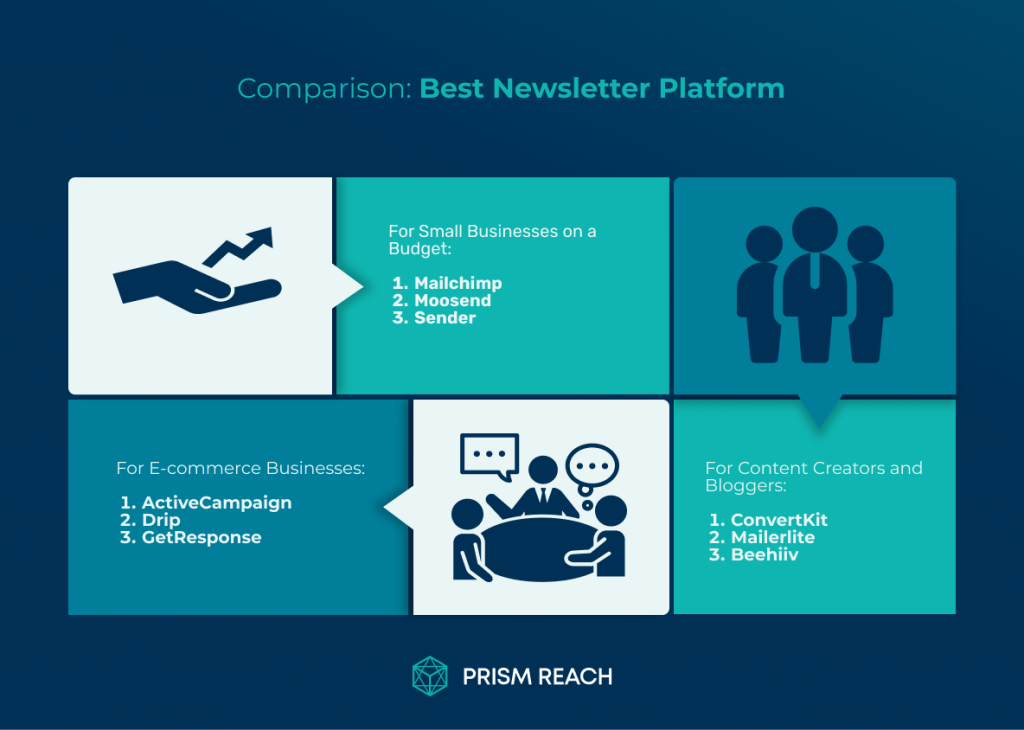
Best Newsletter Platforms for E-commerce Businesses
E-commerce businesses have unique requirements when it comes to newsletter platforms, as they need tools that can integrate seamlessly with their online stores, automate abandoned cart emails, and provide personalized product recommendations. In this section, we will explore three options that cater specifically to the needs of e-commerce businesses.
ActiveCampaign: Powerful Automation and CRM Integration for E-commerce
ActiveCampaign is a robust newsletter platform that offers advanced automation capabilities and seamless integration with popular e-commerce platforms, making it an ideal choice for online businesses. With a range of pre-built automation templates and a visual workflow builder, ActiveCampaign enables businesses to create complex automations tailored to their specific needs.
One of ActiveCampaign’s key strengths is its CRM functionality, which allows businesses to manage and nurture leads effectively. By integrating customer data from various touchpoints, including email interactions and purchase history, businesses can create targeted campaigns and personalized experiences that drive conversions.
The platform also offers advanced segmentation options, enabling businesses to create granular segments based on subscriber behavior and preferences. This level of personalization is particularly valuable for e-commerce businesses, as it allows them to deliver highly relevant content and product recommendations to their subscribers.
However, ActiveCampaign’s advanced features come at a cost, with pricing plans that can become expensive as contact lists grow. Additionally, some users have reported a steep learning curve associated with mastering the platform’s more sophisticated capabilities.
Despite these drawbacks, ActiveCampaign remains a top choice for e-commerce businesses looking for a powerful newsletter platform that can support their growth and drive revenue through advanced automation and personalization.
Drip: E-commerce Focused Email Marketing with Advanced Segmentation
Drip is another newsletter platform that caters specifically to the needs of e-commerce businesses, offering a range of features designed to enhance online sales and customer engagement. With seamless integrations with popular e-commerce platforms like Shopify and WooCommerce, Drip enables businesses to automate key tasks such as abandoned cart emails and post-purchase follow-ups.
One of Drip’s standout features is its advanced segmentation capabilities, which allow businesses to create highly targeted campaigns based on subscriber behavior and purchase history. By leveraging data from multiple touchpoints, Drip enables businesses to deliver personalized content and product recommendations that drive conversions and foster customer loyalty.
The platform also offers a visual workflow builder, making it easy for businesses to create complex automations without requiring extensive technical knowledge. Drip’s comprehensive reporting and analytics tools provide valuable insights into campaign performance, enabling businesses to optimize their strategies and maximize ROI.
However, Drip’s pricing can be a concern for some businesses, as the platform does not offer a free tier, and costs can quickly add up as contact lists grow. Additionally, some users have reported that the email design options can be somewhat limited compared to other platforms.
Despite these limitations, Drip remains a powerful choice for e-commerce businesses looking for an email marketing platform that can support their growth and drive revenue through advanced segmentation and automation capabilities.
GetResponse: Comprehensive E-commerce Features and Webinar Integration
GetResponse is a versatile newsletter platform that offers a range of features specifically designed for e-commerce businesses, as well as unique capabilities like webinar hosting and conversion funnel creation. With seamless integrations with popular e-commerce platforms and a user-friendly drag-and-drop email builder, GetResponse enables businesses to create effective campaigns that drive sales and engagement.
One of GetResponse’s standout features is its webinar hosting capabilities, which allow businesses to engage with their audience in real-time and generate leads. The platform also offers a conversion funnel tool, enabling businesses to create complete sales funnels that guide subscribers from initial interest to purchase.
In addition to these unique features, GetResponse provides a range of e-commerce-focused tools, including abandoned cart emails, product recommendations, and advanced segmentation options. The platform’s comprehensive reporting and analytics give businesses valuable insights into their campaign performance, allowing them to optimize their strategies and maximize ROI.
However, some users have reported that GetResponse’s pricing can become expensive as contact lists grow, and the platform’s advanced features may require a learning curve for some users. Additionally, while the email design options are generally praised, some businesses may find them less flexible than other platforms.
Despite these limitations, GetResponse offers a compelling combination of e-commerce features, webinar hosting, and conversion funnel tools, making it an excellent choice for businesses looking for a comprehensive platform to support their online sales and lead generation efforts.
Best Newsletter Platforms for Content Creators and Bloggers
Content creators and bloggers have distinct needs when it comes to newsletter platforms, as they require tools that can help them build and engage their audience, monetize their content, and streamline their workflow. In this section, we will explore three options that cater specifically to the needs of content creators and bloggers.
ConvertKit: Simplicity and Powerful Automation for Creators
ConvertKit is a newsletter platform designed specifically for content creators, bloggers, and online course creators, offering a range of features that simplify the process of building and nurturing an engaged audience. With a user-friendly interface and straightforward automation tools, ConvertKit enables creators to focus on their content while effectively managing their email marketing efforts.
One of ConvertKit’s key strengths is its simplicity, which allows creators to set up and manage their campaigns without requiring extensive technical knowledge. The platform offers a range of pre-built automation templates, as well as a visual automation builder, making it easy for users to create targeted campaigns that drive engagement and conversions.
ConvertKit also provides robust tools for audience segmentation, enabling creators to deliver personalized content based on subscriber interests and behavior. The platform’s reporting and analytics features give valuable insights into campaign performance, allowing creators to optimize their strategies and grow their audience.
However, ConvertKit’s simplicity may be a drawback for some users who require more advanced features or granular control over their campaigns. Additionally, the platform’s pricing can become expensive as subscriber counts grow, which may be a concern for creators with large audiences.
Despite these limitations, ConvertKit remains a top choice for content creators and bloggers who value simplicity and effective automation tools, offering a range of features that support audience growth and engagement.
MailerLite: Affordable and User-Friendly Option for Bloggers
MailerLite is an affordable and user-friendly newsletter platform that offers a range of features well-suited for bloggers and content creators. With a clean and intuitive interface, MailerLite makes it easy for users to create professional-looking emails and landing pages without requiring extensive design skills.
One of MailerLite’s standout features is its generous free plan, which supports up to 1,000 subscribers and includes basic features like email campaigns, automation, and landing pages. This makes it an attractive option for bloggers who are just starting out or have a limited budget for email marketing.
The platform also offers a range of automation tools, including pre-built workflows and a drag-and-drop automation editor, enabling bloggers to create targeted campaigns that drive engagement and conversions. MailerLite’s segmentation options allow users to deliver personalized content based on subscriber interests and behavior, enhancing the effectiveness of their campaigns.
However, some users have reported that MailerLite’s automation features may be less advanced than other platforms, and the reporting and analytics tools could be more comprehensive. Additionally, while the platform offers a range of integrations, some bloggers may find the options limited compared to more extensive platforms.
Despite these limitations, MailerLite remains an excellent choice for bloggers and content creators who are looking for an affordable and user-friendly newsletter platform that offers a solid range of features for audience engagement and growth.
Beehiiv: Innovative Features and Monetization Options for Newsletter Creators
Beehiiv is a relatively new newsletter platform that offers a range of innovative features and monetization options specifically designed for content creators and newsletter publishers. With a focus on customization, analytics, and revenue generation, Beehiiv provides creators with the tools they need to build and grow a successful newsletter business.
One of Beehiiv’s key strengths is its customization options, which allow creators to design unique newsletter websites and sign-up forms without requiring any coding skills. The platform also offers advanced analytics, providing detailed insights into subscriber behavior and engagement, enabling creators to optimize their content and strategies.
Beehiiv also stands out for its monetization features, which include a built-in ad network, premium subscription options, and a zero-commission model on subscriber revenue. These tools make it easy for creators to generate income from their newsletters without relying on external platforms or sacrificing a significant portion of their earnings.
The platform’s automation tools, including pre-built sequences and customizable triggers, enable creators to streamline their workflow and deliver targeted content to their subscribers. Beehiiv also offers a range of integrations with popular tools and services, making it easy for creators to connect their newsletters with their existing workflows.
However, as a newer platform, Beehiiv may have a smaller user community compared to more established options, which could limit the availability of third-party resources and support. Additionally, some creators may find the platform’s pricing structure less attractive as their subscriber count grows.
Despite these limitations, Beehiiv offers a compelling set of features and monetization options for content creators and newsletter publishers, making it an innovative and powerful choice for those looking to build and grow a successful newsletter business.
Incorporating Hidden Gem Strategies
To elevate your email marketing campaigns, consider integrating these ten hidden gem strategies that are often overlooked but can significantly enhance your effectiveness:
1. Utilize Non-Traditional Platforms
Explore launching newsletters on platforms like LinkedIn or Instagram. These channels allow you to engage with a more targeted audience and leverage existing followers. For example, LinkedIn newsletters can tap into professional networks, while Instagram can showcase visually appealing content, enhancing engagement through familiar social media interactions.
2. Incorporate Interactive Content
Use platforms that support interactive elements such as polls, quizzes, or embedded videos. This approach can significantly increase reader engagement and retention, making your newsletters more dynamic and enjoyable to read. Interactive emails can boost click rates by up to 300%.
3. Segment Your Audience Effectively
Implement advanced segmentation strategies that go beyond basic demographics. By creating segments based on user behavior (active vs. inactive subscribers), interests, or purchase history, you can tailor content to resonate more deeply with each group, improving open and click-through rates.
4. Leverage User-Generated Content (UGC)
Encourage your subscribers to contribute content such as testimonials, photos, or stories related to your brand. Featuring UGC in your newsletters not only builds community but also enhances authenticity and trust among your audience, making them feel more connected to your brand.
5. Create a Content Calendar
Develop a newsletter content calendar that outlines topics and themes for upcoming issues. This proactive approach ensures a steady flow of fresh ideas and helps maintain consistency in your messaging while allowing for timely updates related to events or promotions.
6. Use Countdown Timers for Promotions
Incorporate countdown timers in your newsletters for limited-time offers or events. This creates a sense of urgency that encourages subscribers to act quickly, increasing conversion rates significantly.
7. Integrate SMS Marketing
Consider integrating SMS marketing with your newsletter strategy to reach subscribers on multiple channels. This approach allows you to send time-sensitive updates or promotions directly to their phones, enhancing engagement and response rates.
8. Highlight Success Stories and Case Studies
Feature success stories or case studies in your newsletters to demonstrate the impact of your products or services. This not only provides social proof but also helps potential customers visualize how they might benefit from engaging with your brand.
9. Implement Automated Drip Campaigns
Set up automated drip campaigns that nurture leads over time based on their interactions with previous newsletters. This strategy allows you to maintain consistent communication without overwhelming subscribers with too much information at once.
10. Optimize for Mobile Viewing
Ensure that all newsletter designs are responsive and mobile-friendly since a significant percentage of users access emails via smartphones. A well-optimized mobile experience can significantly enhance user engagement and reduce bounce rates.
Prism Reach: Enhancing Your Email Marketing Efforts
Prism Reach is an innovative AI-powered SaaS solution designed to enhance the effectiveness of email marketing campaigns through deep personalization. This platform stands out by transforming how publishers and content creators engage with their audiences, using sophisticated AI algorithms to customize every aspect of newsletters based on subscriber behavior and preferences.
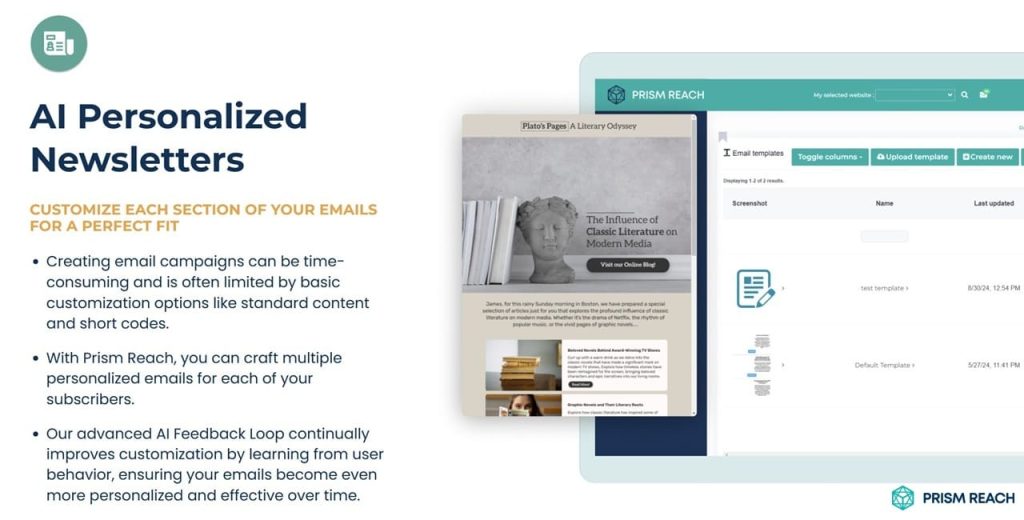
Key Benefits of Prism Reach
- Increased Engagement: Publishers report up to 40% higher engagement rates due to the personalized nature of the content.
- Higher Revenue: Tailored advertising and efficient content targeting lead to higher monetization rates for published newsletters.
- Improved Productivity: Automation and AI-driven insights significantly reduce the time required to create and manage campaigns.
How Prism Reach Enhances Your Marketing
Prism Reach’s core functionality revolves around its proprietary AI technology, which clusters website content and social media posts into relevant categories. By creating detailed user avatars, Prism Reach enables personalized newsletter and SMS content that incorporates factors such as location, engagement history, and predicted interests. This advanced level of personalization leads to higher engagement rates, increased revenue, and stronger customer relationships.
Incorporating Prism Reach with Hidden Gem Strategies
Prism Reach seamlessly integrates with the hidden gem strategies discussed earlier, enhancing their effectiveness:
- Utilize Non-Traditional Platforms: Launch newsletters on LinkedIn or Instagram using Prism Reach’s data to target professional networks and visually-driven audiences.
- Incorporate Interactive Content: Enhance interactive elements by leveraging Prism Reach’s user data to tailor polls, quizzes, and embedded videos to subscriber interests.
- Segment Your Audience Effectively: Use Prism Reach’s advanced segmentation tools to create highly targeted segments based on behavior, interests, and purchase history.
- Leverage User-Generated Content (UGC): Utilize Prism Reach to curate and feature the most relevant user-generated content for each subscriber segment, enhancing authenticity and trust.
- Create a Content Calendar: Integrate Prism Reach’s AI to suggest optimal topics and themes based on subscriber preferences and trending content.
- Use Countdown Timers for Promotions: Implement Prism Reach’s predictive analytics to determine the best times to deploy countdown timers, maximizing urgency and conversions.
- Integrate SMS Marketing: Combine Prism Reach’s email and SMS capabilities to create cohesive multi-channel campaigns that engage subscribers on multiple fronts.
- Highlight Success Stories and Case Studies: Use Prism Reach’s data insights to identify the most impactful success stories and case studies to feature in your newsletters.
- Implement Automated Drip Campaigns: Leverage Prism Reach’s automation tools to set up drip campaigns that nurture leads based on their interactions with previous emails.
- Optimize for Mobile Viewing: Ensure all Prism Reach-designed emails are mobile-friendly, enhancing user experience and engagement across devices.
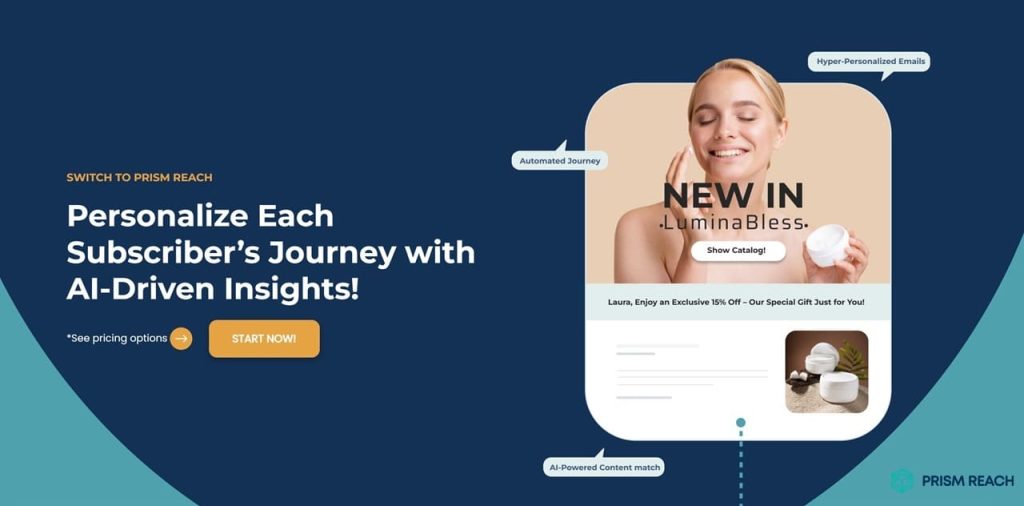
Benefits for Various Business Sizes
Whether you’re a mid-sized publisher or a small e-commerce store, Prism Reach offers scalable solutions to meet your email and SMS marketing needs:
- Mid-Sized Publishers: Enhance audience engagement with personalized content and dynamic segmentation, leveraging Prism Reach’s AI to deliver highly relevant newsletters.
- Small E-commerce Stores: Drive participation with targeted promotions and automated data collection, using Prism Reach to tailor product recommendations and special offers.
- Content Creators: Build stronger connections with your audience through tailored newsletters and interactive SMS elements, utilizing Prism Reach’s advanced personalization features.
Integration and User Experience
Prism Reach emphasizes a seamless user experience with its quick setup and one-click uploads, facilitating easy migration of existing subscriber lists. Its AI-enhanced sign-up forms are designed to increase sign-up rates and improve GDPR compliance, ensuring that your data handling meets the highest standards.
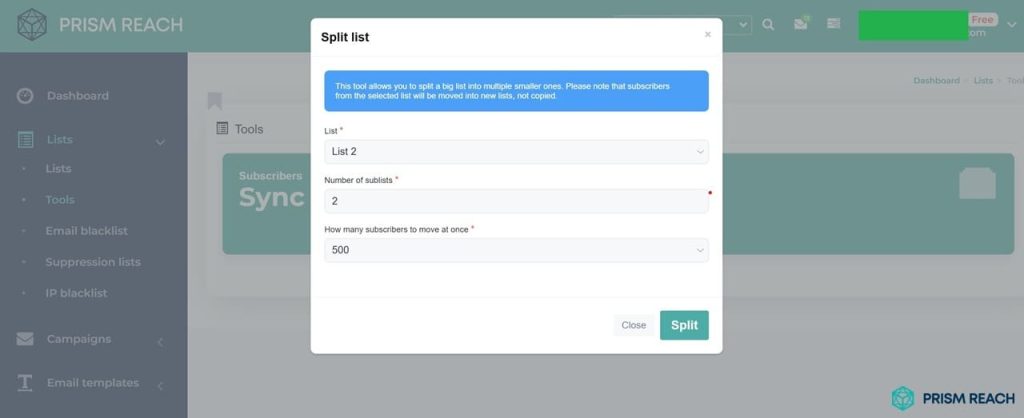
Future Prospects
Looking ahead, Prism Reach aims to expand its technology into the eCommerce sector and explore new ways to leverage AI for broader marketing applications. The company is committed to continuous improvement of its AI algorithms, ensuring that its solutions remain at the cutting edge of technology and marketing innovation.
Conclusion
Choosing the right newsletter platform is a critical decision for any business, as it can significantly impact the success of your email marketing efforts. While there are numerous options available, each with its own strengths and weaknesses, Prism Reach stands out as a particularly innovative and effective solution.
Prism Reach offers advanced features like hyper-personalization, unique user journeys, and an AI feedback loop that continuously optimizes the subscriber experience. By treating each subscriber as an individual and delivering highly targeted content, Prism Reach enables businesses to build stronger relationships with their audience and drive better results from their email marketing campaigns.
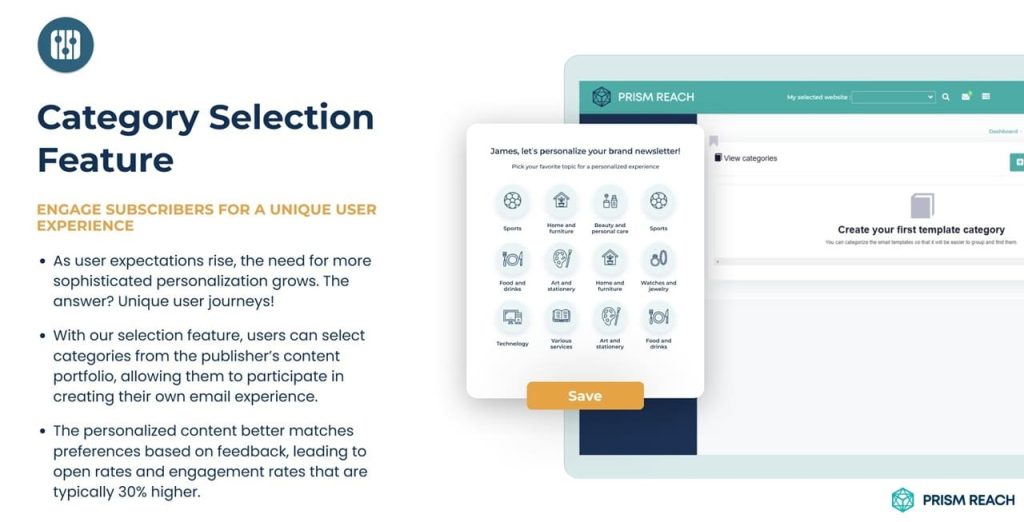
Integrating hidden gem strategies such as utilizing non-traditional platforms, incorporating interactive content, effectively segmenting your audience, leveraging user-generated content, and creating a content calendar can further elevate your marketing efforts. These strategies help enhance audience engagement, build community, and drive higher conversion rates.
Whether you’re a small business owner, an e-commerce entrepreneur, or a content creator, Prism Reach’s advanced capabilities and user-friendly interface make it an excellent choice for anyone looking to take their email marketing to the next level. By leveraging the power of AI and machine learning, Prism Reach helps you unlock the full potential of your email campaigns, driving engagement, conversions, and long-term customer loyalty.
Investing time in researching and testing different email marketing software options can pay off significantly in the long run. By choosing a tool that aligns with your marketing goals, target audience, and strategy, you can maximize the impact of your campaigns without breaking the bank.
For businesses seeking to elevate their email marketing strategy, integrating best practices showcased in these examples and leveraging the advanced features of Prism Reach can drive meaningful results and foster lasting customer relationships.
